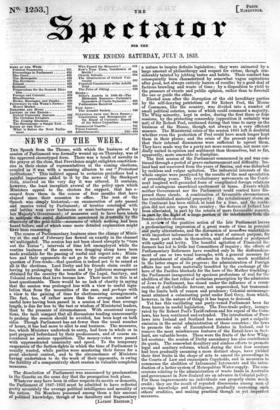NEWS OF THE WEEK.
THE Speech from the Throne, with which the business of the session of Parliament was formally wound up on Thursday, was of the approved stereotyped form. There was a touch of novelty in the prayer at the close, that Providence might enlighten constituen- cies in their choice of representatives at the coming elections, coupled as it was with a meaning allusion to our "Protestant institutions." This indirect appeal to sectarian prejudices had a painful importance added to it by the news of the Stockport riots, received on the very day it was uttered. It contains, however, the least inexplicit avowal of the policy upon which Ministers appeal to the electors for support, th.at has e- scaped from them in the course of four months that have elapsed since their accession to office. The rest of the Speech: was simply historical,—an enumeration of acts passed and _monies voted by Parliament; of treaties concluded with and battles won over barbarous or semi-barbarous pewers by her Majesty's Government ; of measures said to have been taken to mitigate the social dislocation occasioned in Australia by the -discovery of the gold-fields—measures of which nothing had been heard before, and of which some more detailed explanation might haie been reassuring.
The course of Parliamentary business since the change of Minis- try at the end of February has flowed on exactly.in the channel we anticipated. The session has not been closed abruptly to "turn out the Tories " ; intervals of time left unemployed while the routine business of the session was dragging along have been made available for the passing of useful and urgent acts ; Minis- ters and their opponents do not go to the country on the one question of Free-trade—that question is indeed not to be raised at all in the elections. Lord Derby and his friends claim credit as having by prolonging the session and by judicious management obtained for the country the benefits of the Legal, Sanitary, and Colonial reforms that have become law. Their merit in this is at least questionable. There would be no lack of charity in saying that the session was prolonged less with a view to useful legis- lation than from the necessities of the case, and perhaps with a -view to the gaining of time for electioneering arrangements. The fact, too, of rather more than the average number of useful laws having been passed in a session of less than average length, is due far less to the tact or wisdom of Ministerial leaders, than to the pressure of circumstances. With occasional exce tions, the tacit compact that all discussions tending unnecessarily to prolong the session should be avoided, has been kept on both sides. Though Parliament has sat fewer than the usual number of hours, it has had more to allot to real business. The measures, too, which Ministers undertook to carry, had been in whole or in
part prepared beforehand by their predecessors, and of course en- countered no serious opposition. The money-votes were passed with unprecedented unanimity and speed. To the temporary suspension of the faction-fights in which the time of Parliament is usually wasted, while parties were mustering their forces for a great electoral contest, and to the circumstance of Ministers having undertaken to do the work of their opponents, is o • the fertility of a comparatively short session in valuable comple measures.


























